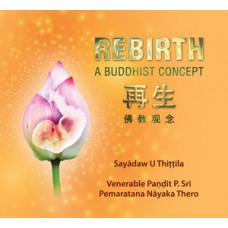REBIRTH: A
Buddhist Concept
再生:佛教观念
Venerable Sayādaw U Thiṭṭila and
Venerable Paṇḍit P. Sri Pemaratana Nāyaka Thero
ENGLISH /
CHINESE
ISBN
978-983-3512-58-4
IJ215/19
Book Size: 5.75” x 5.5”
Pages: 68
Buddhism believes in
rebirth. And when there is rebirth, there will be old age, disease and death.
Death, which is inevitable to all living beings, is described as “the temporary
end of a temporary phenomenon.” Rebirth takes place again immediately after
death and the cycle goes on without end until one attains Nibbāna. The endless
cycle of birth and death is called saṃsāra.
Many people
assume that when we die we will enter the next world, be it heaven or hell or
any other realm of existence, having the same physical appearance as when we
were human beings. This is a wrong assumption. The new being is not the same as
or totally different from his predecessor. The physical appearance is not the
same, depending on the realm of existence one is to be reborn but the same
stream of kammic energy continues in the new being from his predecessor.
To Buddhism rebirth means to suffer continuously. The cause of
rebirth is craving. Therefore, to terminate the process of rebirth and to end
all suffering one has to cut off completely all craving. The termination of the
process of rebirth and the end to all suffering is termed as Nibbāna and the
only way leading to Nibbāna is by following the Middle Path, which is the Noble
Eightfold Path proclaimed by Buddhas of all ages.
The Venerable
Sayādaw U Thiṭṭila gave a very vivid account of what death is and how rebirth
takes place. The following discourse is a compilation of certain relevant
passages taken from the books Essential
Themes Of Buddhist Lectures by Venerable Sayādaw U Thiṭṭila and Life After Death by Venerable Paṇḍit P.
Sri Pemaratana Nāyaka Thero.
佛教相信再生。有再生,将会有老、病、死。死亡是众生所逃不出的。它被称为“现象的暂时停止。”死亡后,立刻又再生。如此的生死轮回持续不断,直至证悟涅盘。这不断的生死轮回称为苦海。
很多人认为,人死后将以同样的外貌再生于天界、地狱界或其它界。这是错误的观念。这新生的众生不与前生相同,也不完全差异。外貌得要看他出生于哪一界。不过,同样的业力将持续于这新的众生。
对于佛教,再生也意味着痛苦的延续。再生的原因是执著。因此,要灭止再生的过程与痛苦,我们就得根除一切的执著。这再生与痛苦的灭止称为涅盘。那朝向灭止的道路就是所有佛教徒所宣称的中庸之道?八正道。
U Thiṭṭila 尊者很清除地描述何谓死亡及再生的过程。接下来的讲义是摘自Thiṭṭila 尊者的
Essential Themes of Buddhist Lectures 及 Paṇḍit P. Sri Pemaratana Nāyaka
Thero 尊者的 Life After Death。
ABOUT THE AUTHORS
Ven. Sayādaw U Thiṭṭila (1896-1997)
Born in 1896 in
Pyawbwe, Myanmar. Studied the scriptures at the age of seven to eight. Ordained
a novice at the age of 15 and already well-versed with the primer to Abhidhamma
studies, the Abhidhammatthasaṅgaha, also the Mahāsatipaṭṭhāna Sutta and
Kaccayana’s Pāḷi Grammar, and received his higher ordination in 1916.
Accepted an
invitation from the Association for Asian Studies at the University of
Michigan, U.S.A., to lecture in America (1959), and delivered over a total of
one hundred and sixty lectures at various universities and arranged meetings in
six months. His later teaching engagement for two years in England allowed him
the opportunity to translate into English from the Pāḷi, for the very first
time that it had ever been done, the second of the seven books of the
Abhidhamma Piṭaka, Vibhaṅga. It was published by the Pāḷi Text Society in 1969
under the title of The Book of Analysis.
The Most
Venerable Sayādaw passed away in Myanmar (Burma), on January the 3rd, 1997, at
the age of 100.
Venerable Sri S.V. Paṇḍit Paraduwa Pemaratana Mahā Nayaka Thera
Venerable Sri
S.V. Paṇḍit Paraduwa Pemaratana Mahā Nāyaka Thera was born in Southern Ceylon
on 17 May 1914 and was ordained a sāmañera (novice monk) on 18 December 1926 at
the age of 12, at the ancient Temple of Purana Vihāra in Elgiriya, Akuressa. He
received higher ordination in 1934.
Ven. Pemaratana
came to Malaya on the Vesak Fullmoon Day of May 1955 to undertake Buddhist
missionary work upon the invitation of the Sāsana Abhiwurdhi Wardhana Society,
Buddhist Temple in Kuala Lumpur (now called Brickfields Buddhist Vihāra).
In 1957, he
arrived in Penang at the invitation of Ven. Gunaratana Mahā Nāyaka Thera to
assist him in the propagation of Buddhism. In 1959, when the Mahindarama Sunday
Pāḷi School (MSPS) was inaugurated, he became its first Principal. He became
the Abbot on the demise of the late Ven. M. A. Upananda Mahāthera on 4
September 1974.
On 25 January
1978, the Venerable Sir was honoured the Chief Saṅgha Nāyaka of Penang due to
his valuable contribution towards the growth of Buddhism particularly in Penang
and Malaysia in general. The award carried the title of Sri Saddhamma Visarada.
He passed away peacefully in 1995.
REBIRTH: A Buddhist Concept / 再生:佛教观念
- Brand: Inward Path Publisher
- Product Code: IJ215/19
- Availability: 99
-
0.00

